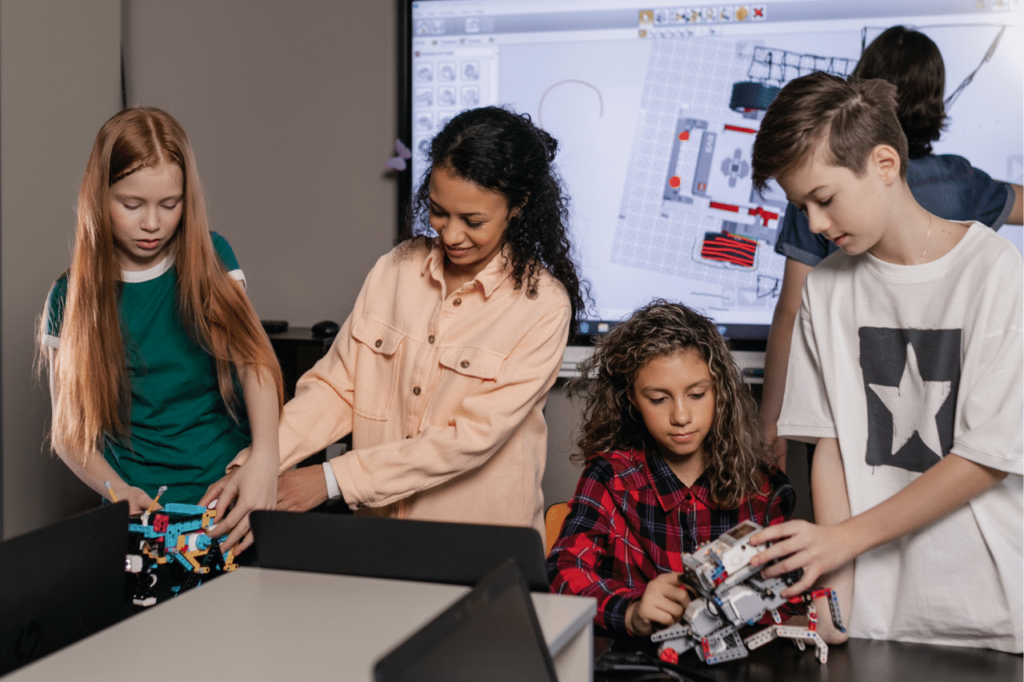10 Non-Tech Skills Kids Gain Through Coding

A lot can be said about the STEM-related abilities that youngsters who learn to code acquire along the process. But what about the soft skills and adaptability kids might gain from courses that have nothing to do with technology? They’re equally as important, and there’s plenty of them!
Coding and robotics are both interdisciplinary topics that could not exist alone. They complement each other with other scientific disciplines (math, science, engineering), but also with non-scientific soft skills that are not taught as separate courses in school. Learning to code for children is thus not only an investment in their future (potentially) STEM profession, but a well-rounded education that will make them a better, more confident, more persevering working partner who isn’t hesitant to share their ideas and think outside the box.
Here are our top ten skills children can acquire through coding:
Learning to code fosters children’s autonomous thinking.
The reason for encouraging children to think independently is simple: we don’t want them to feel lost as soon as they leave our sight; instead, we want them to be clever and ingenious. Learning to code presents children with unknown problems that need the use of previously untapped brain connections. Repeatedly performing such tasks in a play context tells kids that they can easily find out answers to difficult jobs on their own. If you ask them to explain their solution to you and argue why it is the best—even better. Don’t be afraid to make them question your authority (when it comes to coding solutions). Support them and engage in debate (playfully). Their imagination is so vivid and expansive at such a young age that they can easily amaze you with how inventive their ideas can become.
It gives them a sense of power.
A decent education is one of the most liberating things in the world. As parents and educators, we are in a unique position to model this instruction in the best possible way. Coding lessons are typically taught in groups of youngsters who collaborate on a task using their STEM tool of choice. When children learn to code, they not only learn that technology is a tool that they can engage with and help create (rather than be afraid of), but they also learn to collaboratively express and present their ideas in a group setting (friends and educators), make their own choices, take risks, find their own way (solution), and listen to others. As a result, both the self and technology feel empowered.
Coding fosters children’s creativity.
For a long time, it was widely assumed that creativity was something we were born with in varying degrees—that one was either creative or not, and there was nothing anyone could do about it. The good news is that this is not true, because creativity may be learned subconsciously with the correct triggers. Coding is an example of such a stimulus. Creativity is fundamentally the ability to move between two functioning modes of the brain, close and open. Close is where we make immediate decisions to deal with crucial events, whereas open is where we receive, explore, and relax, also known as the fun mode. Children need both when learning to code and must be able to switch between them quickly. A fun and engaging STEM tool, such as Sphero, helps students get comfortable with both active and explorative modes. As a result, there is a mutual interchange of ideas and practices that trains the adaptable use of creativity for future challenges.
Learning to code can even improve children’s communication skills.
Looking for solutions to problems through coding (maybe surprisingly) requires a lot of communication. When children work on a coding exercise in a group, as they generally do in school, they must present, defend, communicate, and explain their ideas to their classmates as well as their teachers. This provides ample opportunity for children to hone their verbal and persuasive skills, which they can subsequently apply and develop in a variety of different areas of life.
Children who learn to code also learn to collaborate.
Our coding courses are based on cooperative play, which teaches youngsters that their classmates are friends and coworkers rather than competitors, and that by constructively joining forces to create the finest project or solution, one achieves far more than by competing alone. While this strategy demands a lot of maturity, it comes with a lot of added benefits, such as the capacity to negotiate, assign responsibilities (by analyzing each other’s strengths and limitations), manage potential problems, and share. It goes against what students are normally taught in school, which is unfortunate but all the more useful.
Coding teaches children design thinking skills.
A method that, despite its name, does not solely apply to designers. Design thinking entails breaking down a problem into smaller sections, brainstorming for the best answer, testing to determine what works best, and selecting the most effective and pleasurable solution based on both functionality and popularity among the people it addresses. Coding encourages design thinking by requesting solutions that aren’t flawless, but are useful and simple to implement. The nature of an ideal solution changes when the target group for coding solutions changes. Children that begin learning to code through play at a young age learn how to adapt to their possible target group and effectively handle their difficulties, providing a fun solution.
It gives them a lot of confidence.
It takes guts to present one’s views in front of a group of classmates, teachers, or even parents. It involves trust in one’s own ideas (developed via empowerment in one’s skills), the capacity to communicate successfully, a thorough comprehension of the given situation (taught by design thinking and creativity), and believing that one is indeed capable of achieving one’s own ideas (independent thinking). If all of these talents are fostered, there is nothing stopping youngsters from confidently tackling their allotted chores and working hard to complete them. Simply defined, coding is a confidence boost based on trust in one’s own skill set.
Coding teaches youngsters a lot about perseverance.
Giving up on projects that don’t appear to be achievable is simple if issues and impediments are seen negatively. Coding, on the other hand, flips this paradigm and teaches youngsters to view issues as a challenge, and an exciting one at that. After all, coding is all about finding solutions to functional problems. The real-life nature and application of our courses, along with the fact that we let children find the solution on their own, allow children to understand that the obstacles they confront are simply a part of everyday life—manageable and to be faced head on.
Another significant advantage is computational thinking.
Indeed, learning to code entails learning from computers. A computer’s algorithmic approach to problems entails steps such as breaking down a problem into smaller pieces, looking for a pattern between these smaller bits, abstracting the pattern to identify its common principles and filtering out the unnecessary, and finally designing steps to address the problem—creating rules, insights, and principles. It’s easy to see how this may be applied to not simply coding but any analytical problem-solving activity in life.
Learning to code helps children reject stereotypes at a young age.
Early exposure to coding in an educational setting helps decrease harmful and needless preconceptions, such as that coding is exclusively an activity for boys and not for girls, that it’s uncreative and requires one to be a reclusive introvert, that it’s boring, tough, or anything else you normally hear. Exposure to the exciting and creative problem-solving industry of coding challenges these prejudices and teaches children that everyone can code. And it opens up a whole new world of playful enjoyment, future professional opportunities, and technological insights that genuinely make one a citizen of the twenty-first century.
So, while coding is unquestionably the skill of the future, it is not the only one. Coding also comes with the extra bonus of universally valued soft skills that are required not only in school education, but in all other aspects of life such as business, personal relationships, and so much more later on. True, coding is an education, but it is much more than just lines on a screen. Schedule an appointment with us to see how our programmable robotics kits not only educate youngsters to code, but also empower them to learn a variety of other important skills.



